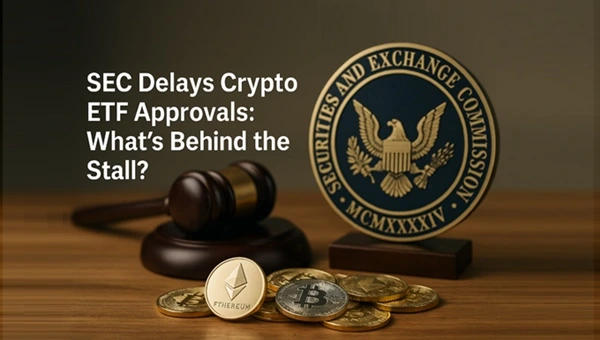

From 2018 through March 2023, the SEC rejected over twenty exchange rule filings tied to spot Bitcoin. The logic focused on concerns about fraud, market manipulation, and lack of adequate surveillance.
Then, a key court ruling in 2023 forced a shift. Regulators reversed course and, in January 2024, approved 11 spot Bitcoin ETFs in a watershed moment for crypto adoption.
After that opening, the field widened. Throughout 2024 and into 2025, asset managers pursued not only more Bitcoin vehicles but also Ethereum and a host of altcoin ETFs. By mid-2025, approximately 72 crypto-related ETF applications were under SEC review, covering tokens such as XRP, Solana, Litecoin, Dogecoin, and others.

Why the Delay Persists?
Several core challenges continue to slow SEC action. First is custody and security. The SEC demands high standards for how digital assets are held and protected from theft or hacking.
Next comes surveillance and market structure. The regulator wants confidence that exchanges listing the ETFs can detect manipulation or price distortion. A third obstacle is token classification. Some assets, especially XRP, face ambiguity over whether they are securities or commodities.
This unsettled status complicates approval decisions.
Moreover, the SEC is being selective about in-kind creation and redemption mechanisms. Originally, approved Bitcoin and Ether spot ETFs were limited to cash-based creation and redemptions. More recently, the SEC permitted in-kind mechanisms for crypto exchange-traded products.
That change opens more efficient structural options but requires firms to adjust their filings and systems accordingly.
In September 2025, the SEC introduced new generic listing standards. Under those rules, exchanges such as NYSE, Nasdaq, and Cboe may list certain crypto ETFs using generic standards rather than a case-by-case review. That shift promises to accelerate approvals, though not overnight.
Some issuers received “delay notices” or requests for amendments. Others simply watched their approval clocks expire. Multiple filings have been sidelined. In certain cases, issuers have withdrawn their applications altogether in frustration.
Major asset managers have placed bets. Firms such as BlackRock, Grayscale, WisdomTree, Bitwise, VanEck, and Franklin Templeton submitted or sought conversion of existing trusts into spot-crypto ETFs. Several contenders target XRP, Solana, and memecoin-based products.
In particular, XRP ETF filings have drawn attention because of Ripple’s legal history and the murky regulatory status of its token.
Current chair, Paul Atkins, inherited a heavy queue of crypto ETF applications. His leadership puts the agency in a pivotal role, as analysts argue he must navigate the tension between opening the market to institutions and ensuring adequate safeguards for investors.
Market Reaction and Investor Sentiment
Investor interest in regulated digital asset products remains strong. The rollout of Bitcoin ETFs in 2024, which drew significant inflows and institutional engagement, demonstrated clear market demand. Still, delays and ambiguity surrounding further approvals have curbed optimism.
Attention now turns to XRP and altcoin ETF prospects, though patience is wearing thin among some investors.
As approval delays persist, some investors turn to futures-based crypto funds, trusts, or derivatives, despite their increased complexity and risk. Others trade cryptocurrencies directly on exchanges, accepting the associated custody and regulatory challenges.
What to Expect Next?
In the short term, more stakeholders must revise or strengthen their filings. Issuers are updating paperwork to reflect in-kind structures, staking components, and more robust surveillance protocols.
The SEC’s decision to let exchanges list certain ETFs under generic rules may ease some bottlenecks.
Yet a complicating factor is a U.S. government shutdown. The SEC is likely to operate with a skeleton staff, forcing further delays in decision-making. That could stall final rulings that were expected in the fall of 2025.
While no guarantee exists, analysts often forecast that some altcoin ETFs might be approved before year-end. Litecoin and Solana are frequent frontrunners. XRP, despite legal ambiguity, also remains a serious candidate.
Choices and Caution
Regulated access to crypto is currently available through Bitcoin and Ethereum ETFs, while other tokens remain largely inaccessible. Futures-based products and trusts present alternative avenues, but they carry distinct risks and structural complexities.
Investors should carefully review custody, fees, and compliance safeguards before participating.
Applicants who adapt their filings to meet SEC preferences could emerge favorably. Any prospective timeline must consider regulatory resources, political dynamics, and market fluctuations.
In conclusion, the SEC’s slow pace on crypto ETF approvals stems from intricate technical and legal factors, not a lack of interest. The next stage will evaluate whether measures like generic listing rules and more robust filings can clear the backlog, with close attention from institutional and retail investors
He has worked with several companies in the past including Economy Watch, and Milkroad. Finds writing for BitEdge highly satisfying as he gets an opportunity to share his knowledge with a broad community of gamblers.
Nationality
Kenyan
Lives In
Cape Town
University
Kenyatta University and USIU
Degree
Economics, Finance and Journalism


Facts Checked by Josip Putarek

 Fact checked by
Fact checked by 
 eabungana@gmail.com
eabungana@gmail.com 